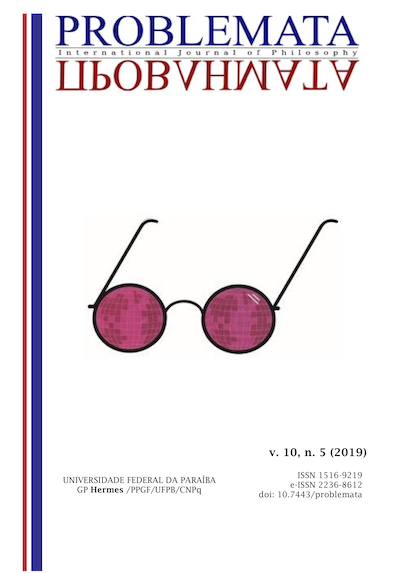CITIZENSHIP, URBANITY AND DIALOGUE:
REMARKS FROM PHILOSOPHICAL HERMENEUTICS
DOI:
https://doi.org/10.7443/problemata.v10i5.49592Keywords:
Gadamer, Citizenship, Understanding, Praxis, DialogueAbstract
This article intends to problematize, based on Gadamer's approach to praxis, the recovery of a notion of citizenship compatible with the current demands of understanding, a key issue of philosophical hermeneutics. Such questioning of the condition of citizen indicates a possibility of thematization of the basic situation of being-in-the-world-with-others (togetherness) that, therefore, is considered as one of the fundamental aspects for the reflection about the city as a space of linguistic and communitarian experience of basic coexistence with others. This task is situated in a shared contemporary moment, marked by the inability to 'dialogue', making it difficult to maintain the common citizen condition itself. Thus, discussing the relationship between citizenship and urbanity emerges to rethink our dialogical way of being, the existential basis of the relationship with others around what is common.
Downloads
References
CACCIARI, M. A Cidade. Barcelona: Editorial Gustavo Gili, 2010.
GADAMER, H. G. A Razão na Época da Ciência. Rio de Janeiro: Tempo Brasileiro, 1983.
GADAMER, H. G. Education is Self‐Education. In Journal of Philosophy of Education, Vol. 35, Issue 4, Nov. 2001, p. 529-538.
GADAMER, H. G. Hermeneutics and Social Science. In Cultural Hermeneutics 2, 1975, p. 307-316.
GADAMER, H. G. Verdade e Método II. Petrópolis: Vozes, 2002.
HEIDEGGER, M. The Question concerning technology. In HEIDEGGER, M. Basic Writings. New York: Harper Collins, 1977, p. 307-341.
HOLZER, W. Ser-na-Cidade: por uma arquitetura e urbanismo como lugar. In Pensando: Revista de Filosofia (UFPI), v. 8, 2017, p. 20-32.
Downloads
Published
Issue
Section
License
Authors who publish with this journal agree to the following terms:
- Authors retain copyright and grant the journal right of first publication with the work simultaneously licensed under a Creative Commons Attribution License that allows others to share the work with an acknowledgement of the work's authorship and initial publication in this journal.
- Authors are able to enter into separate, additional contractual arrangements for the non-exclusive distribution of the journal's published version of the work (e.g., post it to an institutional repository or publish it in a book), with an acknowledgement of its initial publication in this journal.
-
- Authors are permitted and encouraged to post their work online (e.g., in institutional repositories or on their website) prior to and during the submission process, as it can lead to productive exchanges, as well as earlier and greater citation of published work (See The Effect of Open Access).





